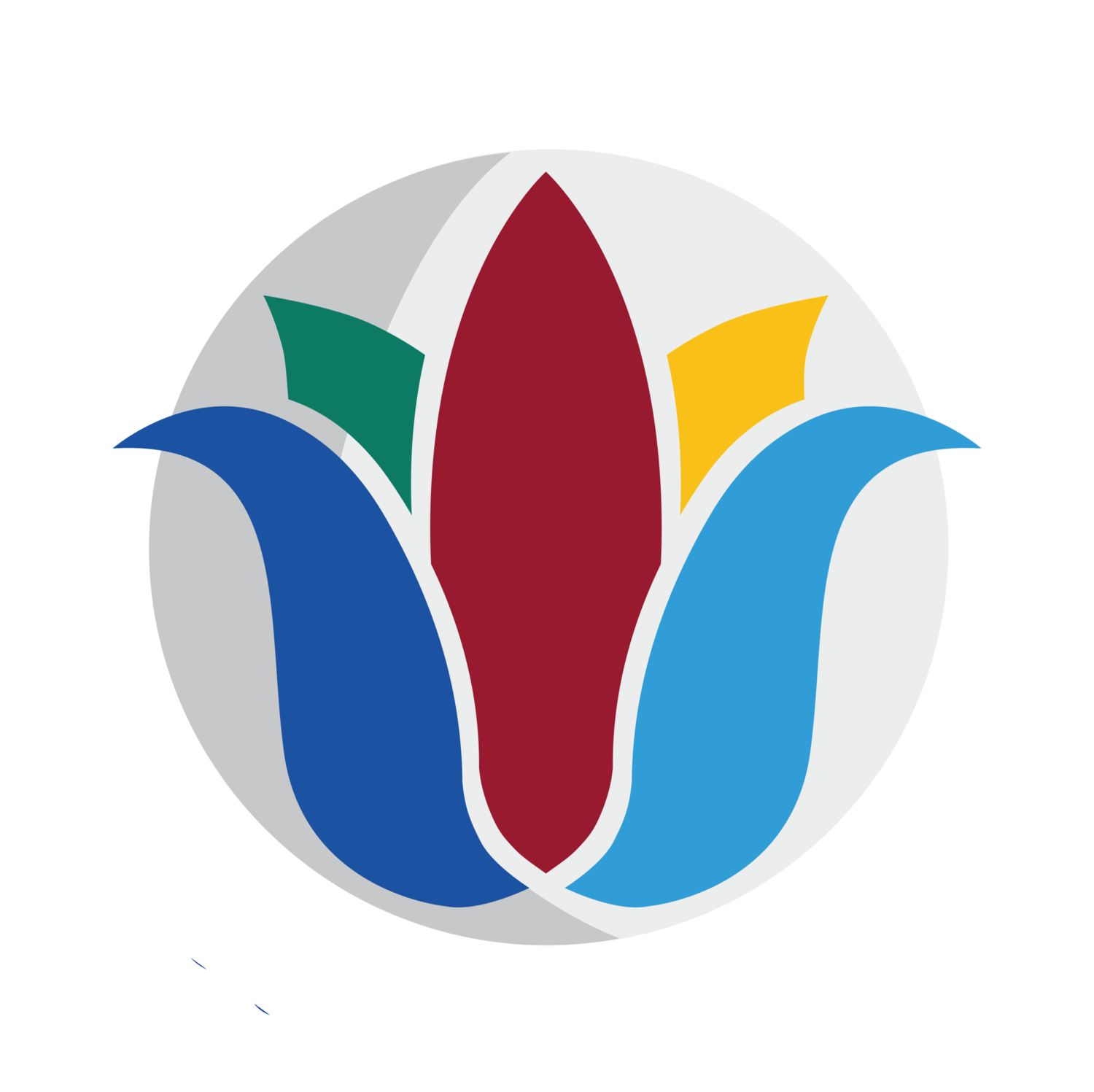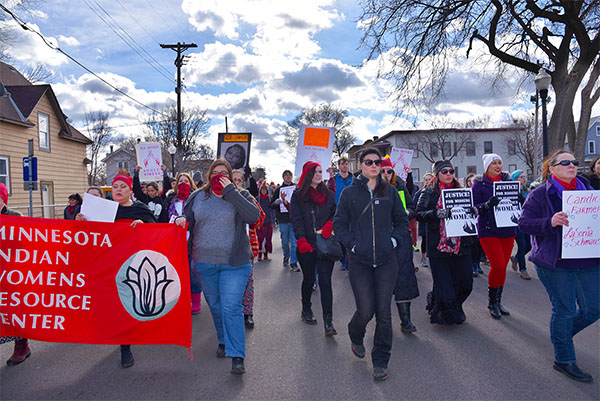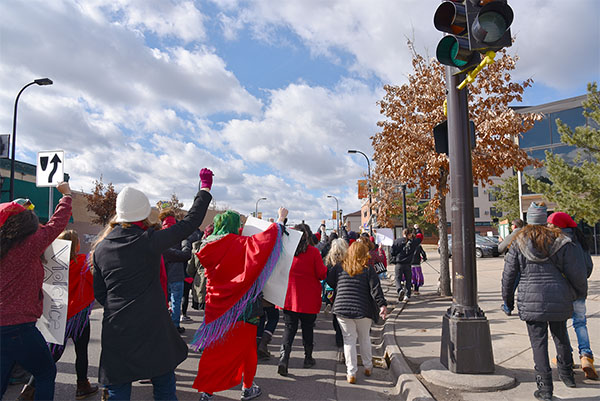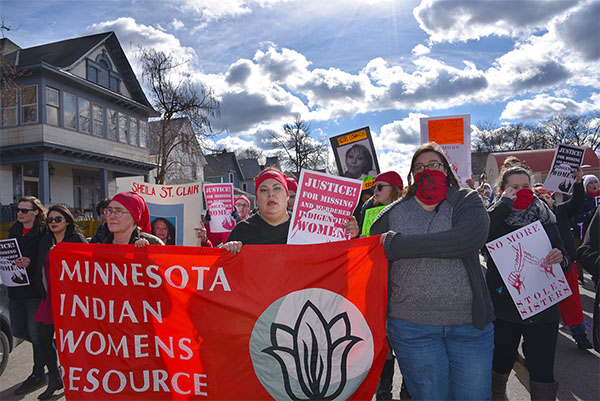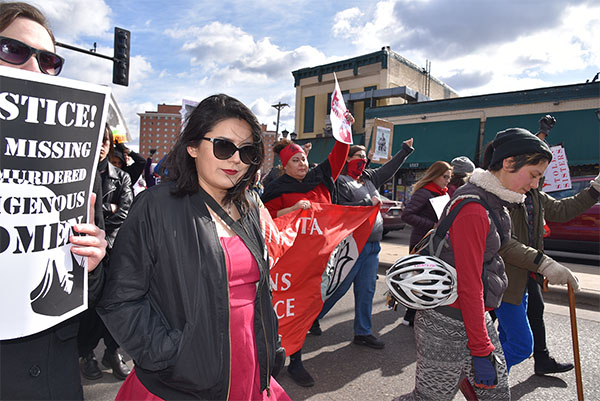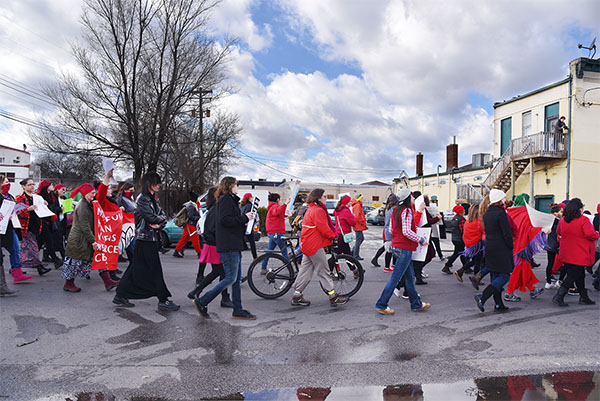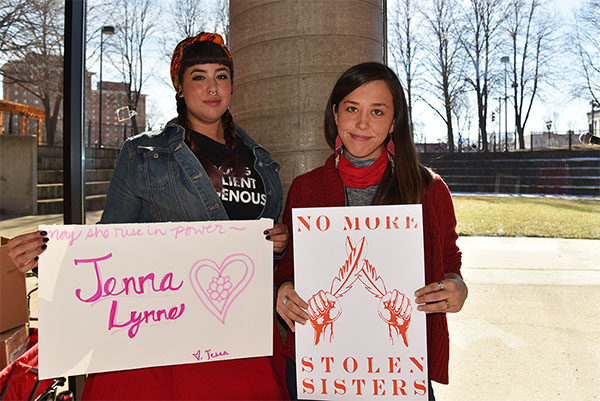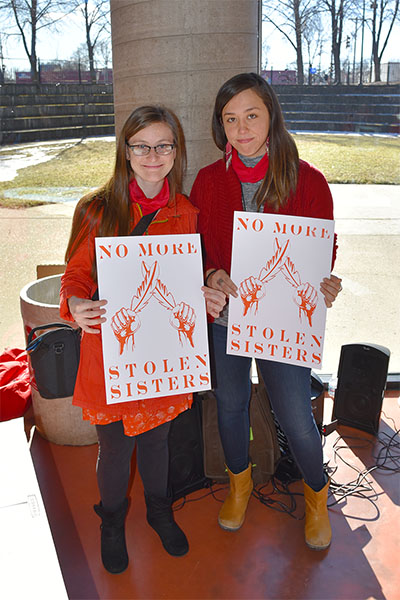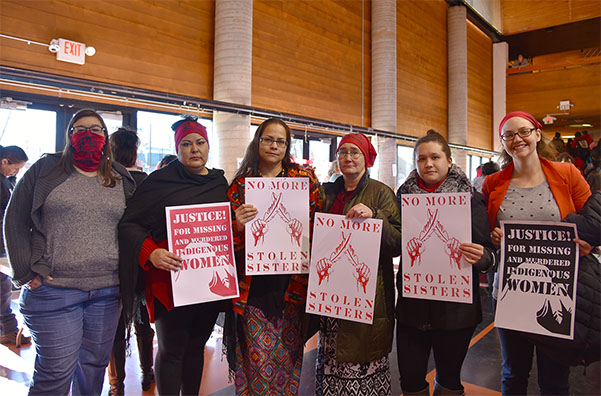A video of the last of a four part Workshop presented by Patina Park on May 31, 2018 at MIWRC.
Hearing Their Voices: Termination to Self-Determination
A video of the third of a four part Workshop presented by Patina Park on May 3, 2018 at MIWRC.
Hearing Their Voices: Allotment to Indian Reorganization Act
A video of the second of a four part Workshop presented by Patina Park on March 2, 2018 at MIWRC.
Photos from the Missing and Murdered Indigenous Women's March, 2018
A Million Dollar Project: MIWRC and the Kateri Residence
Minnesota Indian Women's Resource Center (MIWRC) needs to raise an average of about $20,000 a week between now and July 1, 2018. This fundraising challenge is one of many hurdles the agency faces in its attempt to take over the operation and programming of the Kateri Residence in south Minneapolis, but the agency's stance on the matter is that the services provided are far too valuable for the community to lose. Patina Park, MIWRC's executive director, became familiar with Kateri when she was working on ICWA cases in the early 2000s. The clients she had that were Kateri residents did comparatively well due to the extra support provided by the programming. Beyond providing housing, Kateri offered instruction in life skills such as financial literacy and education, sobriety support, and assistance finding employment to women with few other resources available to them.
In December 2017, St. Stephen's announced the closure of the 45 year old Kateri Residence Program, scheduled for the end of this coming June. The primary reason for closure is financial, but the problems programs like Kateri need to address have also become more challenging. Providing support for alcohol addiction, the primary issue the organization worked to address in past decades, does not require expensive licensing or complex treatment. Now, with many clients struggling with opioid addiction, St. Stephen's has acknowledged that the need has grown beyond their mission and capacity and made the difficult decision that they can no longer maintain the programming, even if they had the funding to do so.
Almost immediately after the announcement, people began reaching out to Patina-- with complementary programming and shared clients, MIWRC appeared well-positioned to help. It wasn't until a meeting at the Women's Foundation, with representatives of the Kateri Residence, United Way, and others in attendance, that she announced MIWRC would attempt to absorb Kateri programming. As far as she knows, MIWRC's is the only proposal to include the continuation of the current programming with or without the physical space.
There are a number of reasons MIWRC is poised to succeed in managing this programming, not least of which is access to more diverse funding sources than St. Stephen's. These include grants available only to native organizations and a billing relationship with the Fond du Lac Tribe of Lake Superior Chippewa that allows MIWRC to bill for services through the tribe at a substantially higher rate than through Medicaid, as well as strong relationships with other community organizations. MIWRC also has the capacity to expand current programming, potentially offering healthcare for parents and children, chemical dependency treatment, a group residential housing rate through partnership with tribes or Hennepin County. Ideally, this expansion will result in the creation of a two-year model of care with the potential to be applied in other parts of the state, and beyond.
"Lots of little things need to be done," says Patina, "but this programming is too important to lose." Not having Kateri, she goes on to say, would result in "many more children in foster care, for much longer." Nearly always, when child protection is involved, children are unable to be reunified with their parents until "safe and sustainable" housing is achieved, but parents without custody of children are excluded from many housing resources. This catch-22 means that there is virtually nowhere for mothers to go where they can reunify with their children while involved in an open Child Protection case. Trusted by the county as a safe environment, and offering a two year program to support family stabilization, Kateri offered something rare: hope. One of the biggest struggles when working with families, Patina found, was convincing parents that there was a chance they could get their children back at all.
St. Stephen's will not be making a decision about what to do with the physical space until sometime in February. Whether or not the property, which needs roughly $411,000 in repairs to ensure sustainability, is granted to MIWRC, the agency is committed to continuing the programming. Already strategizing for the "Million Dollar Project", MIWRC plans to raise funds to cover the needed repairs or acquire a new space for the program, with enough left to cover the costs of sustaining programming until new funding sources can catch up. With failure not an option, the agency continues to explore every avenue that could potentially help with the process.
Hearing Their Voices: Colonization to Reservation
Video of the first of four workshops presented by Patina Park on February 1, 2018 at MIWRC.
MIWRC Is Trying To Preserve Kateri Residence Programming
Staff Profile: Cecilia Petit
Cecilia Petit
Cecilia Petit, originally from Washington but most recently living in Boston for school, found MIWRC because of the agency's national reputation as one of the only urban organizations working to specifically serve American Indian women impacted by domestic and sexual violence. She started her position as a Sexual Assault Advocate in June, and has recently taken over coordination of MIWRC's Two-Spirit Program, a two-year-old program that creates a safe space to address external factors that lead to marginalization of Two Spirit and Native LGBTQ individuals and encourages a reconnection to cultural teachings.
Relocating has been the biggest challenge of her first couple of months, as she'd never even been to Minnesota before starting work here. Cecilia's working on building a new community here in the Twin Cities and learning to navigate logistical challenges such as knowing what local resources are available to direct people towards. Throughout the settling in process, however, she's been grateful for the support of her coworkers. She says that "people have been super, super welcoming and helpful," since day one.
Cecilia is also enjoying the opportunity to work with some good people doing amazing work. She is looking forward to being mentored by other MIWRC advocates and growing in her own ability to help clients. She just took over the coordination of MIWRC's Two-Spirit Program in September. There is a core group of people involved with the program who are hoping to start doing more outreach and cultural education beyond just the group setting-this internal motivation to create a more intentional community is impressive to Cecilia, who is really happy to be a part of it.
Cecilia sees the friendly workplace community here at MIWRC as a big benefit of the job. She says, "There is a lot of opportunity for growth in the organization. Ideas aren't just tabled but are actively worked on." She has also been surprised by how supportive clients are of each other-that they are coming to MIWRC not just to get services for themselves, but to help each other.
Overall, her first few months have been very positive. When asked what her favorite thing about working at MIWRC is, she said, "I love everybody here! Staff of course, but also our clients-just great people everywhere!"
Staff Profile: Sue Kincade
Sue Kincade
Sue Kincade has been working with MIWRC since 1986, just a few years after the agency was founded. She was originally hired to be the agency's Office Manager and Affirmative Action Officer, a position that gradually developed into the role of Human Resources Director that she holds today. After leaving the agency for a few years early on, she jumped at the opportunity to return and has been here ever since. As the Human Resources Director, Sue provides administrative and Human Resource support to MIWRC's staff. During her time here she has, "had the opportunity to work with extraordinary leaders and staff in our community, including working with all four of the Executive Directors at MIWRC!"
She has seen some major changes throughout her time with the agency, including the closure of some programs, such as the Cherish the Children Childcare Center, and the opening of others, such as the Nokomis Endaad Outpatient Treatment program in 2010. The one accomplishment that stands out for Sue is being a part of the staff involved when the agency acquired our current building. Referring to the work involved with coordinating the acquisition, she says that, "the tremendous determination and perseverance that it required to overcome the great challenge was monumental!"
Sue's favorite thing about working at MIWRC is being a part of an outstanding community agency, and a place where, "women can find their strength again and know there's hope and that we are here for them." She adds that her time working here, "has been an incredible journey and so rewarding to be a part of an organization whose work supports women and families to find their strength again and provides hope and who does outstanding work while providing and honoring our beautiful cultural traditions."
Thank You, Senator Franken
Our Executive Director, Patina Park, sent this open letter of thanks to Senator Franken for his most recent contribution to our agency. The Star Tribune has a story about the gift
Today on Indigenous Peoples Day and on behalf of the Minnesota Indian Women's Resource Center (MIWRC), I wish to extend my gratitude to Senator Al Franken for his generous contribution on Friday, October 6th. Senator Franken has been a long-time champion for Native American governments and people, both on and off the reservations, in urban and rural, and particularly in developing solutions to end the violence that has affected our women and girls. Senator Franken has taken the time to listen to us explain the problems affecting our families and to support our solutions, rather than creating solutions himself. MIWRC considers him a deeply trusted ally and our relative.
On Friday, October 6th we were approached by the Senator's staff to inquire whether we would accept a donation from the Senator. Though we are aware of the controversy surrounding Harvey Weinstein, and the fact that this money came from political contributions made by him, we do not believe that this gift from the Senator is tainted by that controversy. The gift will be used to provide funding for programming which is focused on empowering our mothers and their families and providing opportunities to heal from the trauma that our community has experienced for many generations. We believe a gift given to us with a good heart is a gift that carries good. Senator Franken has consistently shown us that he has a good heart and we are grateful for his gift
We are not deaf to the actions of Mr. Weinstein. We are deeply saddened by the stories that are now coming forward and send out our prayers to those who were harmed by his actions. We hope they all can find the healing they need and know in their hearts that they did nothing to deserve what happened to them, and they are all worthy of respect and honor. We also pray for Mr. Weinstein that he can accept responsibility for the harm he has caused and take actions to heal himself. He cannot undo what he has already admitted to doing, but he can stop himself from causing any further trauma.
Wopila Tanka Senator Franken for your gift and for your efforts to raise Indigenous issues at both the local and national levels. You are truly a trusted friend.
MINNESOTA INDIAN WOMEN'S RESOURCE CENTER
Patina Park
Executive Director
October 6th, 2017
Patina Talks About Child Poverty On MPR
Thirty-six percent of Native children in Minnesota are living in poverty. While the rest of the state's ethnic groups saw a reduction in poverty rates, the poverty rate for Native kids is on the rise. Patina joined Tom Weber on MPR News to talk about the new findings with Stephanie Hogenson from the Children's Defense Fund.
Organ Donation
Organ donors save lives in Indian Country, but there is a shortage of donors and it affects native communities particularly hard. Indian Country Today focuses on the issue with this article.
For Savanna LaFontaine-Greywind
Savanna...
She is our Daughter, our Sister, our Relative.
We grieve because Savanna will never be the Mother she was meant to be.
We grieve because her daughter's spirit chose Savanna but she will never be held in her arms.
We grieve because Savanna had her entire life ahead of her and it was stolen from her.
We grieve because they stole another one of our beautiful sisters... another one over and over.
We grieve because we have to and will need to again pull from the resilience and strength in our DNA, stronger than centuries of the effects from colonization.
We again send our love and prayers to a family who have lost a loved one, and to the community as a whole as we now collectively grieve another murdered and missing Indigenous woman.
Savanna LaFontaine-Greywind...
You are loved and you will not be forgotten.
-by Patina Park
Statement on the Race Riot in Charlottesville, NC
August 14, 2017
This past weekend the country witnessed the intensity of hate and violence provoked by the gathering of white supremacists and nationalists in Charlottesville, Virginia, for the “Unite the Right” Rally. Many of us watched it unfold on the news, in social media, and with live video feeds. People from across the country who align themselves against white supremacy and racism expressed shock, anger, disbelief, and feelings of hopelessness over what they witnessed. Though the rally was marketed as a protest against removing a statute of General Lee from a public park, many of the participants came armed with sticks, knives, shields, assault rifles and law enforcement-level body armor, clearly as a means of intimidation and force against those who would come to stand against their racism and white supremacy.
Our hearts are with the family and friends of Heather Heyer, who was killed by a violent act, and Officers Jay Cullen and Berke Bates, who were killed when their helicopter crashed while assisting law enforcement activities during the rally. We continue to pray for those who were physically injured and for those who were emotionally and spiritually harmed.
We respect the bravery of those who came from across the country to stand in solidarity and placed their lives in the direct line of vicious physical and verbal abuse.
We were moved by the continued show of solidarity against hate and racism that sprung up in cities across the country throughout the weekend and which continue.
But we ask those who were surprised that this level of racism continues to exist in this country to take a hard look at the racism that exists more covertly throughout the country, especially in your own world. As a Native American agency that works with our urban community, we see evidence of racism everywhere in the disparities that exist in all the areas we work to overcome. We see it in regard to housing, access to healthy, affordable food, education and graduation rates, child protection involvement, arrests and sentencing, employment, physical and emotional health, cancer rates, heart disease, sexual assault and exploitation, domestic violence, the list goes on and on. We see it in systemic responses which create further barriers for families to access services. We experience it in the standards used which encapsulate a white, middle-class model as the ideal for outcomes. We read it in the articles and hear it in commentary around entitlement and “welfare abuse” to justify cutting services and implying that our communities somehow earned or deserve their poverty and struggles.
The hateful, violent racism we all saw in Charlottesville was loud, vile, and reprehensible. However, the quiet, insidious racism and microaggressions that go on every day and which go unseen and perpetuated unknowingly by many non-POC individuals are just as violent to our communities. We need our allies to stand with us. We need our allies to listen to us. We need our allies to see racism, even when there aren’t Facebook live feeds.
Patina Park
The Missing and Murdered Indigenous Women's March, 2017
February 14, 2017, was more than just Valentine’s Day for MIWRC, our community, and others across the state of Minnesota. The third annual Missing and Murdered Indigenous Women’s March gathered hundreds to remember and mourn for the moms, daughters, grandmothers, sisters, aunties, and friends that have been lost. The purpose of this march was to raise awareness of a dangerous reality: Native women in Minnesota are dying as a result of domestic violence at alarming rates each year. In 2015, for example, Native women made up almost 25% of the total number of homicides related to domestic violence, even though they only make up 1% of Minnesota’s population.(reference) As disquieting as these numbers are—the real cost, the real pain these disparities are causing in peoples’ lives, was made clear at the march on Valentine’s Day. Dozens and dozens of handmade signs with photographs and names of loved ones send messages beyond the reach of data.
To all our relatives who are, “Lost but not forgotten,” on Valentine’s day and every day, we love and honor you.
For more information on this issue, see the following:
- 12015 Femicide Report
- Futures Without Violence Report
- MINN POST Article 2-14-17
- Duluth News Tribune Article 2-14-17
by Ashley Butner
MIWRC Segment on Native Report
MIWRC was featured in a segment of Native Report. See the Video
Minnesota Department of Human Services Excellence Award
MIWRC received a 2016 Commissioner's Circle of Excellence Award from the Minnesota Department of Human Services. See the video
Regaining Spiritual Wealth
University of Minnesota students from the College of Education and Human Development interviewed Suzzane Koepplinger, our previous Executive Director, for their Our Callings Blog where they interview people who have found their calling in life. It's a good read!
Stay Strong
Our Executive Director, Patina Park, sent this email to the staff this morning, November 9, 2016:
I went to bed last night in shock and woke up feeling numb.
I know all of you are experiencing many feelings about this election. We are now facing an unknown administration with very little experience and no experience in government. But we will continue. We will face whatever comes with the same fierce determination, strength, and commitment we always have. We have the resiliance and and power of our ancestors, who continue with us.
So pray. Pray for our leaders, including our President Elect, that they will do their best for ALL people in America. Pray for all those who woke up fearful for their families and lives. Pray for each other. The power of our prayers is infinite.
My friend Joe Hobot posted this last night after the election results became clear. I share these beautiful words with all of you.
"Despite the Westward Expansion of a brutal and violent invader ...
We can still hear the drum
Despite the repeated crackle of rifle fire at Wounded Knee ...
We can still hear the drum
Despite the beatings and lashings and deafening silence behind the walls of Boarding Schools ...
We can still hear the drum
Despite the gas and clubbing at Standing Rock ...
We can still hear the drum
Despite what we may see before us now - we will still hear the drum ...
Take heart, be strong, live in honor of all who came before and let us get to work to on behalf of all who are coming next
Let us hear the drum again and move forward together towards destiny, liberation..."
Resilience. What Does This Mean?
Walk in prayer. What does this mean?
On our first trip to the Oceti Sakowin Camp, we pulled in at approximately 12:30 am. We were weary from the road, so much so that everything was funny. Even our experience of almost getting stuck in a ravine, and having to reverse out of it with two cars behind us. We found a clearing to put up our little camp. There we were with our lighters in hand trying to put our tents up. A young gentleman came up and offered assistance. I don’t feel he pitied us, rather he welcomed us and even let out a couple of chuckles because he too found it humorous. We put up the tent but because we were so tired we decided to go without the rain guard, which was the best decision ever. We fell asleep to a blanket of stars. The next day, a young man came up to our crew and offered a hygiene packet. It is just that way. Guests are honored. We are raised to treat our guests with hospitality, even going so far as to offer them the most comfortable bed, and of course the best of coffee. I ran into my Cousin Tink and Uncle Robert that day as well. Hugs were given and received as if no time had passed since the last time we seen each other. We aren’t strangers. Not only do we share DNA, but we share common experiences, memories, determination, and a healthy sense of humor.
We were there the day DAPL security released their dogs on the People. That was a hard day. All I could think of was my precious pretty Walda. Walda is a 7 month old golden retriever who believes with every fur of her being that everyone is her friend. She is quick to wag her tail, and quick to show you just how easy it is to sit and shake. Love comes easy. Hate, not so much. That night, I fell asleep to the sound of drumming and a man talking about the importance of staying in prayer. I woke the next day thinking of the last conversation I had with my Grandma. The last face to face conversation I had with my Grandma was when she was in a nursing home in Rapid City, SD. My Aunties, Uncles, and even my Mom had said that Grandma was losing her hearing and possibly even her mind. I’m not a boisterous person. In fact many people tell me to speak louder. That day, Grandma never requested that I speak louder. I never had to repeat myself, and our conversation never wavered outside the topic at hand. Grandma told me to never let go of the land, because if we did that we would lose ourselves, and we would have nothing left. I made a promise to my Grandma that day. Everything I would do from that day forward, would be with the land in mind. Which brings me to wonder how law enforcement agencies not of Lakota Treaty Territory has the ability to arrest Lakota People and their guests on Lakota Treaty Territory guaranteed to them via the 1851 Fort Laramie Treaty? According to the United States Constitution Article VI Clause 2, also known as the Supremacy Clause, “This Constitution, and the laws of the United States which shall be made in pursuance thereof; and all treaties made, or which shall be made, under the authority of the United States, shall be the supreme law of the land; and the judges in every state shall be bound thereby, anything in the Constitution or laws of any State to the contrary notwithstanding.”
We just got back a couple of days ago from our most recent trip to Standing Rock. Camp was heavy earlier in the week. But I saw something happen on Thursday (11/3/16), I felt something happen on Thursday, and I witnessed something happen on Thursday. We were sitting there around a fire in the evening with a woman who fed us, drinking tea and having some deep conversations sprinkled with humor. DAPL's lights were shining ominously on the bluff above camp. Planes could be heard circling above. Something happened. I don't know what. But the drums began, singing began. Something sparked the Camp. Laughter, drumming, dancing, and a sense of purpose, humility, and relatedness returned.
Resilience. What does this mean? Despite the lights, planes, and other tactics meant to wear us down, we can still be found amongst our relatives in laughter.
Walk in prayer. What does this mean? There is power in prayer. But not power in the literal sense. The power that is prayer gives one a sense of purpose, humility, and relatedness.
Mitakuye Oyasin.
by Dawn Bjoraker
Grandma and me
Me and cousin Tink
Me and uncle Robert
